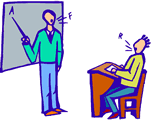|
Tutor Tips - Environmental Words
 Beginning
readers need to turn on the reading mechanism in their brain.
They may have spent much of their lives ignoring the print
that surrounds them. By using words from their environment
such as common brand names or signs they see everyday, you
can get students reading at every turn. Labels from common
products can be pasted on one side of a flashcard and the
word itself can be written on the other. Students can dictate
sentences using these words and then read them back to the
tutor. Word parts such as the word "it" in "exit"
or the word "press" in "express" can be
pointed out to help students begin the habit of seeing words
in chunks. Beginning
readers need to turn on the reading mechanism in their brain.
They may have spent much of their lives ignoring the print
that surrounds them. By using words from their environment
such as common brand names or signs they see everyday, you
can get students reading at every turn. Labels from common
products can be pasted on one side of a flashcard and the
word itself can be written on the other. Students can dictate
sentences using these words and then read them back to the
tutor. Word parts such as the word "it" in "exit"
or the word "press" in "express" can be
pointed out to help students begin the habit of seeing words
in chunks.
http://www.ymcaphilly.org/tutor/index_files/page0003.htm
Word Parts
By breaking words into parts such as prefixes, suffixes, roots,
and syllables, words become more manageable. Also known as
chunking, this strategy helps learners with multi-syllabic
words.
http://www.ymcaphilly.org/tutor/index_files/page0003.htm
Compound
Words
Similar to word parts, compound word practice helps students
see words as chunks. Reading compound words also trains the
eye to look at the second half of the word. This is especially
helpful for students who drop endings such as -ing or -ed.
http://www.ymcaphilly.org/tutor/index_files/page0003.htm
Word Families/word
Comparisons
You can assist your learner in making comparisons between
words that are similar or from the same 'family'. For example,
the word "examine" is similar to the words "exam",
"re-examine", and "examination." A discussion
can ensue about how these words are similar or different in
spelling and in meaning.
http://www.ymcaphilly.org/tutor/index_files/page0003.htm
Phonics
Phonics is the process of reading a word by making letter-sound
associations. It is often helpful for small words such as
cat and ball, but it is not as helpful for more complicated
words such as ghost or pneumonia. We recommend that phonics
be used as just one of many strategies for deciphering difficult
words and that it not be relied on as the only instructional
technique.
http://www.ymcaphilly.org/tutor/index_files/page0003.htm
Sight Words
Many words are best learned by memorizing them. Students can
keep their own list of words that they want to memorize. To
assist the process of memorization, use flashcards or have
your student write the word several times. Visual learners
may want to pay particular attention to the shape and length
of the word. A kinesthetic learner might want to trace the
word on a desk or write it in large letters on a chalkboard.
(For more info. on learning styles, see Tutor Tips for Learning
Differences) For many adult learners who have difficulty with
phonics, sight word memorization may be the most efficient
way of learning to read. Though it may seem like a difficult
task to memorize many words, just remember that the Chinese
memorize all their words by sight-- they do not have a phonetic
alphabet such as ours to rely on.
http://www.ymcaphilly.org/tutor/index_files/page0003.htm
Language Experience
Stories
One of the best ways to find reading materials that are relevant
to your learner's life is to have her dictate stories to you.
This is known as the language experience approach. The story
can be factual or fiction. It can be one line or pages long.
What is important is that the person recording the story writes
exactly what is said. By writing what is said, the student
can see and hear the words. This sight/sound relationship
is basic to effective reading. After the dictation, the story
can be read and re-read by both the learner and the tutor.
Words and sentences can be extracted for more concentrated
practice. These stories can be collected in a portfolio and/or
as part of a book.
http://www.ymcaphilly.org/tutor/index_files/page0003.htm
 Print this article
Print this article
View other articles
|

